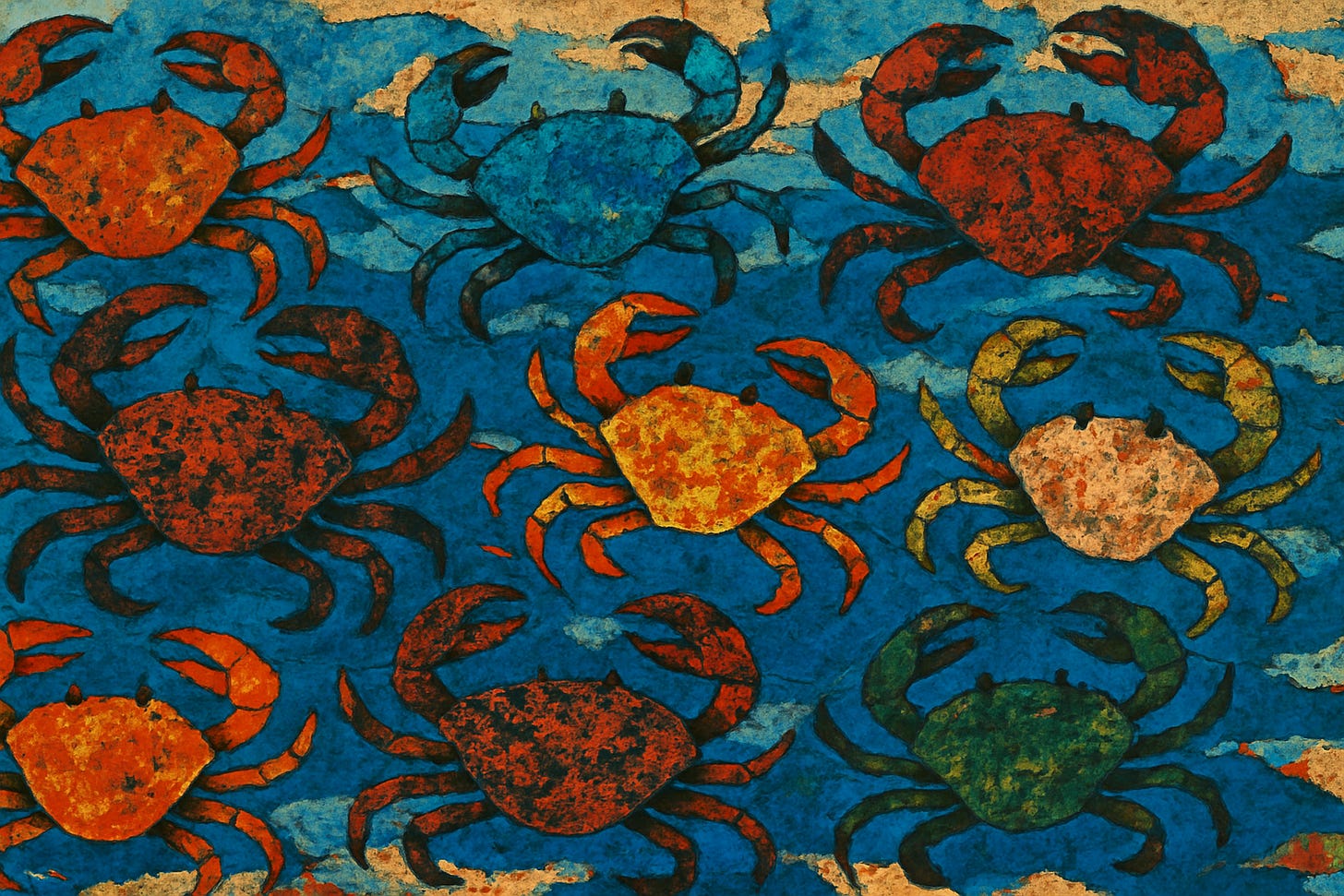🦀 15 things I learned this summer
Hey folks! It’s been a while. I spent the summer walking absurdly long distances and tinkering with new projects, including launching an online course on generative AI in sustainability. Still, I managed to pick up a thing or two along the way. Here’s a list!
Evolution keeps making crabs. The crab-like body plan has evolved at least five separate times over the past 250 million years, a recurring trick so common it has its own name: carcinisation.
That fresh-cut grass smell is really the scent of distress. Plants can’t run, so when injured, they release chemical signals, warning neighbours, summoning helpful microbes, and calling in insects to attack the pests chewing on them.
Antarctica generates less than $1.2 billion from fishing and tourism, but its role in storing carbon and cooling the planet is worth approximately $179 billion per year.
Nature degradation could wipe 12 per cent off the UK economy — more than the 2008 financial crisis (5 per cent) and the COVID pandemic in 2020 (11 per cent).
In 1985, Coca-Cola spent $250,000 and almost a year building a NASA-approved space can. Pepsi hacked together one from an actual shaving-cream can. Astronauts tested both, hated them, and carbonated drinks have been grounded ever since.
In 18th-century England, rising tea consumption cut mortality and improved health. The benefit wasn’t from tea itself, but from the fact that people were now drinking water that had been boiled, killing off pathogens.
Researchers studied 11,705 LinkedIn profiles and found that narcissistic CEOs tend to hire managers just like them. The more self-promoting the boss, the more likely new executives are to be narcissists too.
In 1810, nails made up 0.4 per cent of the U.S. economy, about the same share that air travel (0.5 per cent) or personal computers (0.3 per cent) held in 2019. Two centuries ago, nails were as central to growth as planes and PCs are today.
Archaeologists found Britain’s oldest bedbugs at Vindolanda, a Roman fort near Hadrian’s Wall. Parasites date back to around 100 AD, suggesting the Romans brought them over. Even with all that bathing, the empire couldn’t shake the itch.
Researchers found that a queue outside a restaurant makes it look popular. Diners are okay with a 15-minute wait, but any longer and the appeal fades, unless the place already has a good reputation.
New data from 160 million records shows Britain was industrialising a century earlier than we thought. By the 1600s, peasants were giving way to shoemakers, blacksmiths, and home weavers.
Hypnagogic jerks — those twitches before sleep — may be a leftover from when primates slept in trees. As the body relaxes, the brain mistakes it for falling and jolts the muscles awake.
In Britain, assets of people who die without a will and heirs usually go to the government—except in Lancashire, where they still pass to the Duchy of Lancaster, the monarch’s private estate dating back to 1265. Prince William, as Duke of Cornwall, enjoys similar rights there, including ownership of any “royal fish” caught off its shores: whales, porpoises, and sturgeon.
One theory, known as Schwarzschild cosmology, suggests that our universe is the interior of a black hole within a larger “parent” universe. From within it, we’d never know the parent existed.
Climate change shifts time itself. Since 1972, Earth’s liquid core has been slowing down, which makes the planet spin faster (weird but true). But melting ice, by pushing water toward the equator, slows the rotation and partly offsets this effect. Without that slowdown, the first-ever negative leap second would be expected in 2025. Thanks to global warming, it’s been postponed to around 2028.
What I’ve been reading
What J.M.W. Turner saw, and what we still can see: “Turner was known to court the public with performative showmanship, which sometimes included finishing his paintings in public. During the pre-opening ‘Varnishing Day’ at a Royal Academy exhibition in 1832, he added a splash of red to a painting that hung next to a work by his sometime rival John Constable. ‘He has been here and fired a gun,’ Constable is said to have declared, feeling his own painting overshadowed.”
England was created at the negotiating table: “From 878 to 954, the Anglo-Saxon Chronicle recorded many battles but also many peace treaties and submissions. Peace treaties were often short-lived, but they were important in limiting bloodshed and maintaining lines of communication between rival groups.”
Why Britain has so many names for a bread roll: “You can see that a number of common pathways of new word formation are in evidence: borrowing (roll was borrowed from French), synecdoche (barm meaning yeast gets transferred to bread, the thing containing the yeast), semantic narrowing (cob meaning something round comes to refer specifically to a round bread), and compounding (putting together two existing words of the language to form a new one, e.g. teacake).”
From the archives
And that’s it for today! Thanks for reading! If you enjoy the newsletter, share it with a friend. And if you really enjoyed it, consider upgrading to a paid subscription: it helps support my work and means a lot.
Elia Kabanov is a science writer covering the past, present and future of technology (@metkere)
Cover art: Elia Kabanov feat. DALL-E.


